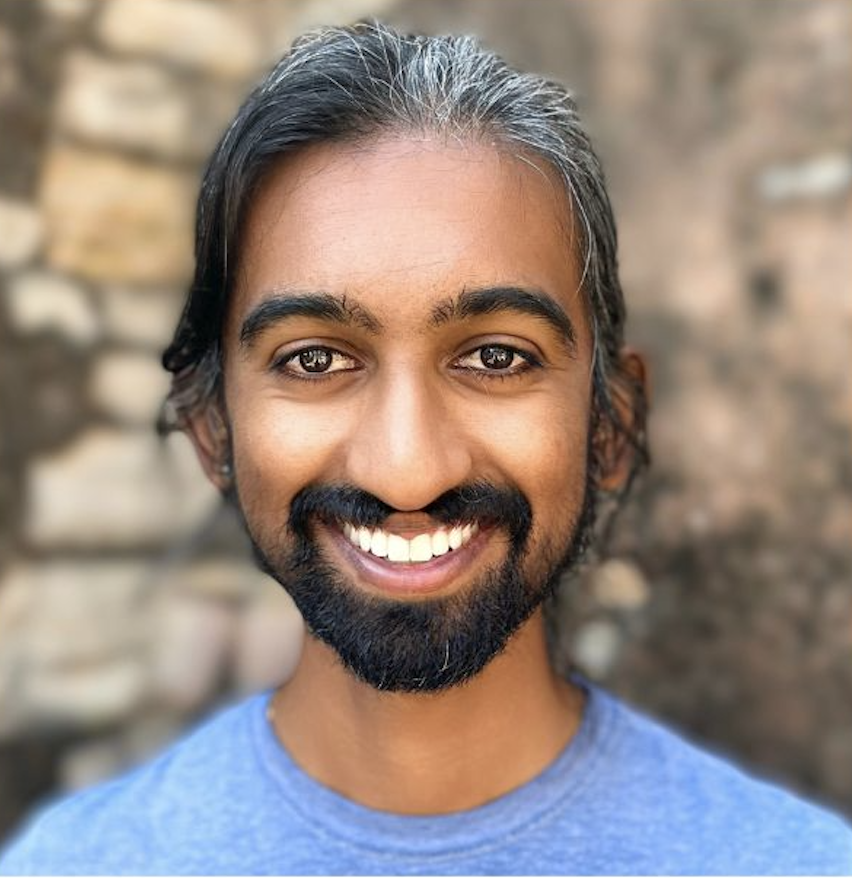Suchin Gururangan

I am a research scientist at Meta GenAI, on the Llama team. I received my PhD in Computer Science in 2024 at the University of Washington. I was supported by the 2022 Bloomberg PhD Fellowship, and was previously a visiting researcher at Meta AI and a predoctoral resident at AI2.
📥 Email
🧑🏾💻 Github
🎓 Google Scholar
📚 Semantic Scholar
𝕏 Twitter
✍🏾 Blog
PhD Fellowship Proposal Advice
by {"name"=>" ", "avatar"=>"/assets/images/bio-photo.jpg", "bio"=>"sʌtʃɪn gʊɹʊɹʌngʊn", "links"=>[{"label"=>"Pronunciation", "icon"=>"fas fa-volume-up", "url"=>"http://ipa-reader.xyz/?text=s%CA%8Ct%CA%83%C9%AAn%20g%CA%8A%C9%B9%CA%8A%C9%B9%CA%8Cng%CA%8An&voice=Raveena"}, {"label"=>"Twitter", "icon"=>"fab fa-fw fa-twitter-square", "url"=>"https://twitter.com/ssgrn"}, {"label"=>"GitHub", "icon"=>"fab fa-fw fa-github", "url"=>"https://github.com/kernelmachine"}, {"label"=>"Email", "icon"=>"fas fa-envelope", "url"=>"mailto:sg01@cs.washington.edu"}, {"label"=>"Semantic Scholar", "icon"=>"fas fa-book-open", "url"=>"https://www.semanticscholar.org/author/Suchin-Gururangan/40895369"}, {"label"=>"Google Scholar", "icon"=>"fas fa-graduation-cap", "url"=>"https://scholar.google.com/citations?user=CJIKhNIAAAAJ&hl=en"}]}
A few years ago I published a blog post on writing graduate school personal statements which I think lots of folks found useful, so here is the next edition: tips for writing a successful PhD fellowship proposal!
My 2022 Bloomberg Data Science Fellowship proposal can be found here.
Here are a few tips and tricks I learned along the way about writing a good fellowship proposal:
Treat this proposal as a “thesis proposal lite”
As opposed to a personal statement for grad school applications, I think you should treat the fellowship proposal as a “thesis proposal lite”. If you’re at the stage where you are applying for fellowships, you’ve probably got some research experience under your belt, an idea of a broader story you’re interested in pursuing, and hopefully at least one or two published papers that provide motivations for your pursuits. Pretend you’re talking to your thesis committee about what you want to work on, and convey those points here! Generally, I found this exercise to be extremely useful for my PhD process, since it forced me to step back and think about the broader implications of my research.
Be bold in your introduction!
This is a style choice, but I try to start off papers and proposals boldly: with snappy, eye-catching statements about the world that grip the reader. In this proposal, I start off by saying that the language model pipeline is centralized. Make sure your statements about the world are not too wordy or long, and make sure the statements are not subjective enough to turn certain readers away. It is best if you can add citations to your first sentences. For the rest of the introduction, follow the general writing guidelines, e.g., use active voice. I sometimes like to end the introduction with an outline of the rest of the document, but that is not always necessary.
Use your previous work as a scaffold
Your goal is not only to convince the sponsor that you have exciting ideas. You also want to show them that you have done previous work in your proposed research area that strongly suggests your ideas will be successful. And you want to show off that you can complete projects. So, all your ideas should build off previous work you have pursued. In my case, I chose to focus on modular LM architectures and decentralized LMs, which primarily built on our work on DEMix layers. In each section, my ideas for future work drew on specific findings from DEMix. Whenever possible, I tried to cite other relevant work that I published.
Remember this is a closed publication
This means that no one will see your proposal outside of the funding committee, unless you post it publicly :). So, if you have that perfect sentence or two in one of your papers about something you’d like to argue, copy it over here! Obviously, you don’t want your proposal to re-hash one of your papers, but if there are some verbatim snippets, I think that’s totally fine.
Organization
There are many ways to go about organizing your proposal, and it’s probably going to be specific to the fellowship guidelines. For this proposal, I chose to focus on two broad ideas — one lower-level idea about modular architectures, and another higher-level idea around decentralized models but builds on the previous section. Bold keywords when possible to draw people’s attention.
However, make sure the proposal is cohesive with a single overarching idea. It’s tempting to talk about all the random ideas you have, but it’s better to convey one solid, well thought-out idea with lots of different sub-directions, than a maze of fifty ideas that may not be related to one another.
Tie your interests with the sponsor’s interests
Remember that your research proposals should be interesting to the sponsor! Do a bit of research on the sponsor’s research or application areas, and try to tie in your directions to what they might be working on. For example, I chose to add a few sentences around how my work is applicable to Bloomberg’s interest in building models for breaking news, where domains are rapidly updating and modularity is useful. The Bloomberg fellowship also has a “social good” dimension, and so social themes weave throughout my document.
Speculate on the future
Feel free to add lots of future work in your proposal, including half-baked directions. For example, a lot of the decentralized LM section contains future work that I wasn’t sure would totally work, but had a vague idea about. These lofty ideas are the things that will get the reader excited to fund you. But again, make sure all your ideas are cohesive and supported by previous work.
Closing
I think writing a fellowship proposal was an amazing exercise to learn how to craft a longer term research agenda. Regardless of the outcome of your application, hopefully you’ll learn some new stuff about writing, generate novel ideas for research, and get a head start on your thesis!
Feel free to reach out if you have more questions, and if you are currently applying for fellowships: good luck!
tags: